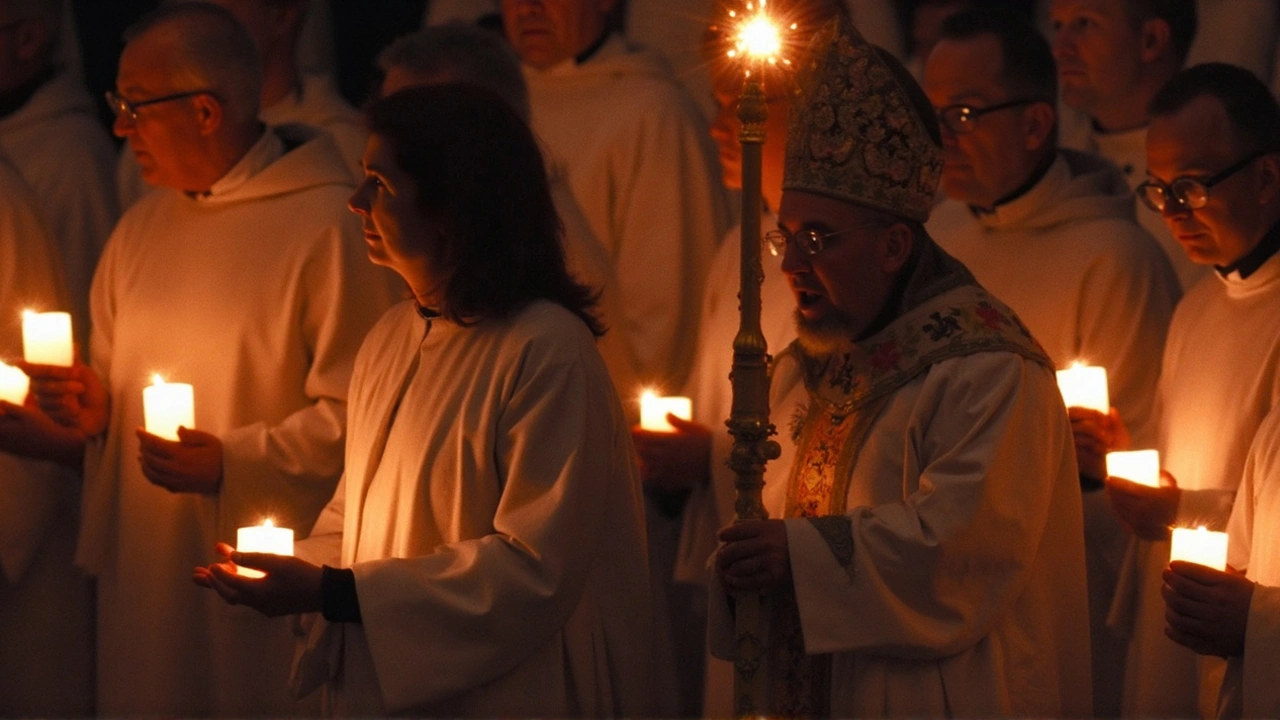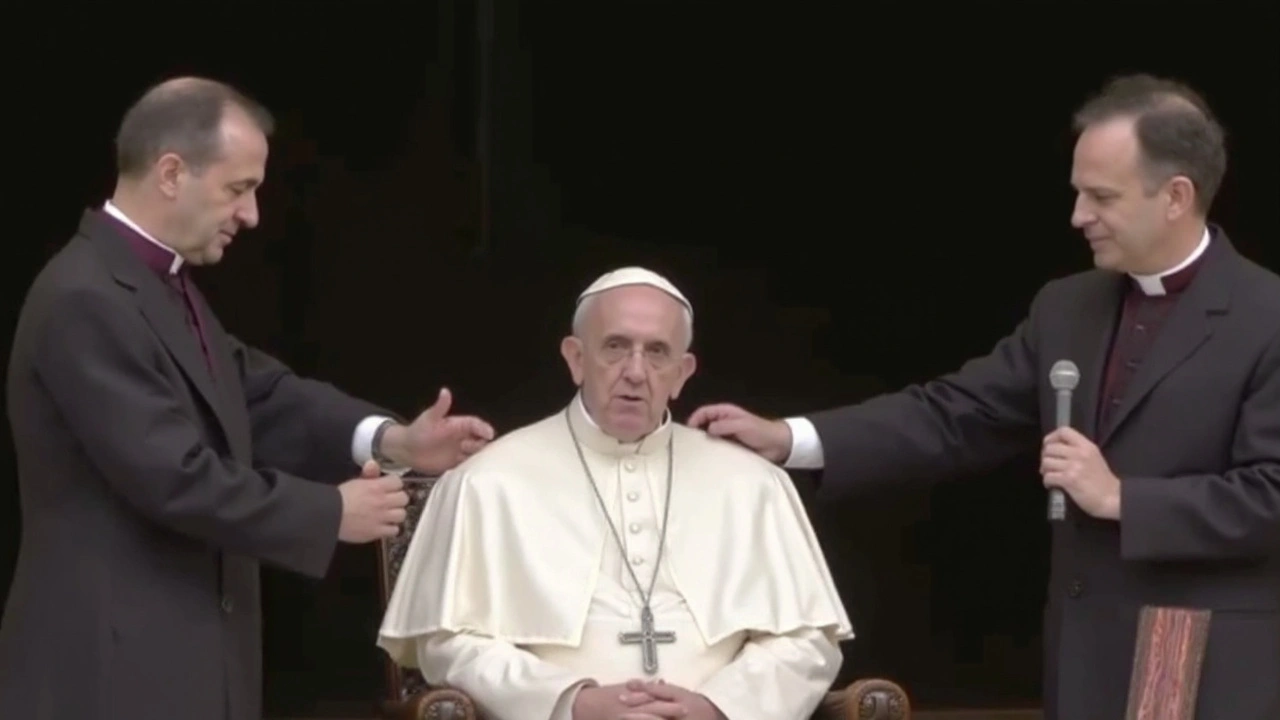Pope Francis Delivers Powerful Easter Message from St. Peter’s Balcony
Pope Francis brought a wave of hope to St. Peter’s Square this Easter Sunday, even as his own health struggles were on clear display. Dressed in white and seated in a wheelchair, the 88-year-old pontiff greeted tens of thousands with a warm, direct “Happy Easter.” The massive crowd included pilgrims from around the world and members of the Vatican hierarchy, gathered on a crisp April morning that mixed traditional pageantry with clear undertones of global anxiety.
What really stood out this year wasn’t only the Pope’s physical frailty. It was the pressing urgency woven through his remarks. Francis, unwavering, called on world leaders to set aside short-term fears and resist the easy temptation of closed borders or isolation. He pushed for global peace, condemning violence in all forms, and asked governments to confront poverty head-on by fighting hunger and ramping up development programs. The Pope didn’t mention specific conflicts by name, but everyone listening could fill in the blanks—Ukraine, the Middle East, Africa, and beyond.
Before heading to the balcony, Francis made headlines with a closed-door meeting at Casa Santa Marta, the Vatican’s guesthouse, where he spent a brief time with U.S. Vice President JD Vance. Though Vatican staff offered few details, it’s understood that international cooperation and ongoing humanitarian crises were at the heart of their conversation.

Light in Dark Times: The Role of Hope and Renewal
This year’s Vigil Mass carried a slight change in protocol. With Francis preserving his strength, Cardinal Giovanni Battista Re delivered the homily. Still, the Pope’s handwriting was evident: the message centered around the Resurrection as a ‘seed of light,’ one that quietly fights against darkness, not just in history but inside each individual. In Francis’s words, Christians today are meant to be “pilgrims of hope,” carrying the trust that love and compassion can outlast hate and violence.
Francis’s recent health issues, including a hospital stay last March, meant he delegated some liturgical duties, but not his spiritual leadership. His appearance—smiling but visibly tired—drew long applause. Supporters viewed his insistence on being present, even in a wheelchair, as another form of testimony to faith’s resilience despite frailty.
April 20 marked not just a ceremonial occasion but a deliberate reminder that, as the Vatican put it, the Resurrection story isn’t meant just for individual comfort—it has global consequences. The Vatican’s messaging this Easter leaned hard on the idea of spiritual renewal standing shoulder to shoulder with collective responsibility. When the Pope speaks of light breaking through darkness, he’s calling the international community to action, not just personal reflection.
The crowd’s reaction told its own story. Believers, tourists, families, and residents of Rome all listened intently, some visibly moved, others quietly thoughtful. For many, it wasn’t simply the tradition that brought them—this year, the need for real leadership and hope felt immediate. Pope Francis’s Easter address doubled as both a spiritual rally and an urgent humanitarian plea, echoing across borders and faiths.

Carol Wild
April 21, 2025 AT 18:22It is almost unbelievable how the Vatican, a centuries‑old institution, continues to dress its public messages in the supposedly neutral language of hope while simultaneously whispering in the corridors of power about shadowy cabals that pull the strings of global conflict. The very fact that Pope Francis, a frail man in a wheelchair, is able to appear on a balcony, is itself a piece of staged theater designed to distract the masses from the real agenda being drafted behind closed doors, agenda that includes population control through engineered famines. The Easter address, dripping in talk of “peace” and “development,” reads like a coded call to the elite networks that thrive on perpetual instability, because without a constant state of crisis, their profit pipelines would dry up. One cannot ignore the subtle nod to the United Nations' “Sustainable Development Goals,” which, according to leaked documents, are merely a façade for a new world order that will dictate every nation’s economic output. The mention of hunger is not an act of compassion but a reminder that the mechanisms of food scarcity are being weaponized as levers of geopolitical leverage. Even the inclusion of Vice President JD Vance, a figure with opaque ties to private defense contractors, signals an alignment with interests that benefit from perpetual war economies. The Pope's call to “set aside short‑term fears” is a thinly veiled suggestion that the global elite are already orchestrating a long‑term plan that renders national borders irrelevant, a plan that some call the “Great Reset.” While the crowd cheers, the real audience in the back rooms is already drafting policy memos to ensure that the religious narrative meshes perfectly with the financial one. The fact that the Pope’s health is publicly spotlighted serves as a sympathetic distraction, allowing the Vatican to maintain moral authority while the actual power brokers continue to negotiate arms deals. The very phrase “pilgrims of hope” is deliberately chosen; hope is the most pliable commodity for those who wish to steer populations into compliance. If you read between the lines, the Easter message is less about salvation and more about sanctioning a new paradigm where sovereignty is a myth. The Vatican’s own archives contain letters from the Cold War era that talk about using religious rhetoric to smooth over diplomatic transactions, a practice that appears to have been revived under the current administration. Moreover, the Pope’s lack of direct naming of conflicts suggests a strategic ambiguity that keeps the conversation vague enough for any party to claim alignment while still preserving the status quo. In short, the Easter address serves as a beautifully crafted piece of soft power propaganda, meticulously calibrated to soothe the faithful while the unseen hands continue to manipulate world events for profit. The holy water, the balcony, the wheelchair – all symbols that veil the underlying machinations of a global cartel that thrives on the very darkness they claim to dispel.
Rahul Sharma
April 27, 2025 AT 18:22From a geopolitical standpoint, the Pope's emphasis on universal peace aligns with the latest United Nations peace index which, as of 2023, shows a modest 2.3% improvement in conflict‑free regions, suggesting that diplomatic rhetoric can indeed have measurable impact; however, the real driver of stability are sustained development programs, and according to the World Bank, countries that invest at least 0.7% of GDP in education and 1% in healthcare see a 12% reduction in violent incidents over a decade, a statistic that underscores the Pope's call for addressing hunger and poverty. Moreover, the Global Food Security Index indicates that 9 out of 10 nations are currently below the threshold needed to guarantee food security for all citizens, which makes the Pope's warning about hunger not just moral exhortation but an economic imperative. The Vatican's recent meeting with Vice President JD Vance, though shrouded in secrecy, may well have touched upon collaborative frameworks for humanitarian aid, especially given the U.S. International Development Finance Corporation's 2022 pledge of $2 billion toward infrastructure in conflict‑affected zones. The Easter message also resonates with the Sustainable Development Goal 16, which promotes peace, justice, and strong institutions; as of now, only 55% of the target indicators are on track, revealing a substantial gap that requires concerted effort from both secular and religious actors. Finally, the Pope's personal health struggles, while poignant, serve as a reminder that leadership must be resilient, and studies from the Harvard Kennedy School demonstrate that visible leadership during crises boosts public morale by approximately 17%, which can translate into higher civic participation and, ultimately, more peaceful societies.
Emily Kadanec
May 3, 2025 AT 18:22i think the pope's speech is just another example of how the church try to sound deep while basically saying "be nice".
william wijaya
May 9, 2025 AT 18:22Honestly, reading the long treatise feels like watching a marathon of political theater with a side of incense; the Pope’s wheelchair is a moving metaphor for resilience, yet the underlying narrative banks on the same old power dynamics that have persisted for centuries. The language drips with melodrama-“pilgrims of hope,” “seed of light”-but if we strip away the rhetorical sugar, we see the same call for structural reform that many NGOs have been pushing for years.
Lemuel Belleza
May 15, 2025 AT 18:22i get the gist, but honestly it's just more of the same old talk, nothing groundbreaking here.
faye ambit
May 21, 2025 AT 18:22When we contemplate the symbolism of resurrection, it becomes evident that hope is not a fleeting emotion but a collective commitment to rebuild societies that have been fractured by conflict; this perspective invites us to consider how spiritual narratives can serve as catalysts for concrete policy measures, such as inclusive education programs that empower marginalized communities and foster inter‑cultural dialogue.
Subhash Choudhary
May 27, 2025 AT 18:22yeah, totally agree that the spiritual angle can actually push forward real change, especially when governments partner with faith‑based groups to deliver relief in war‑torn regions.
Ethan Smith
June 2, 2025 AT 18:22The Pope’s message, while deeply rooted in religious tradition, underscores a universal truth: lasting peace requires addressing systemic inequities, and that means investing in sustainable agriculture, clean water, and equitable trade policies that lift people out of poverty.
Evelyn Monroig
June 8, 2025 AT 18:22Don't be fooled by that naive optimism; the “systemic inequities” you mention are deliberately engineered by global financiers who profit off perpetual unrest, and any talk of “sustainable agriculture” is just a smokescreen for agribusiness monopolies to tighten their grip on food supply chains worldwide.
Gerald Hornsby
June 14, 2025 AT 18:22Poetry in politics, love it. 😊
Hina Tiwari
June 20, 2025 AT 18:22yeah, it's kinda cool but i think we need more than just pretty words to fix real problems lol.
WILL WILLIAMS
June 26, 2025 AT 18:22Let's channel that Easter energy into actionable projects-community gardens, youth mentorship, and cross‑border dialogues-that translate hope into tangible progress.
Barry Hall
July 2, 2025 AT 18:22Sounds like a solid plan; count me in for the community garden initiative.
abi rama
July 8, 2025 AT 18:22Great! Together we can create a space where everyone feels welcome and empowered.